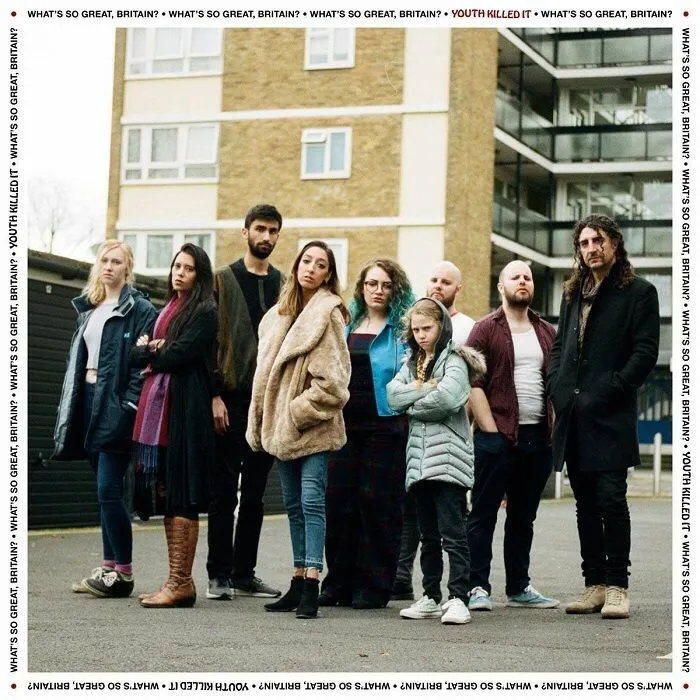Words: Miljan Milekić
Youth Killed It, an indie punk five-piece from Norwich, England, is slowly but surely becoming a staple in the alternative scene. With their sophomore album ‘What’s So Great, Britan?’ on the way, the band offers strong social commentary on British society, but also on the world in general. While we’re impatiently waiting for the new record, we caught up with guitarist Carlos Montero. Check the interview below.

Hey guys! Your new record ‘What’s so Great, Britain?’ is almost here, and I know quite a few people who can’t wait to hear it. What can you tell me about the release?
Carlos: In all honesty, it feels like our first real album. We put a lot of love into it, we took our time, we nurtured it, and we turned it into something we’re all proud of. We connect with it, and it means the world to us, which is really the most important part of music. If you can’t connect with the songs you’re writing, how could anyone else?
The record name is really symbolic, while the singles we heard so far are an all-out attack to everything you find wrong in British society. Do you feel that somewhere in the future, your records can be used as a historical document of a time you live in?
Carlos: I think everything that is happening right now, all around us, all the art and music being created – it will all be used as a historical document, but only in the near future. In 200 years time things will be very different and what is relevant now will no longer be relevant. It definitely feels like a time capsule of all the shit we’re dealing with right now. Hopefully, people can listen to it in the future and see that the struggle was real for a lot of people, maybe using it as a warning for what can happen.
On the record, you took on a variety of subjects, some of them being rarely talked about, like toxic masculinity. How do you choose what to write about, and what makes one subject more important than the other?
Carlos: Well, personally, we feel like toxic masculinity is definitely being addressed by other bands, too. For example, ‘Samaritans’ by Idles is an amazing track that tackles that exact subject. We do feel it’s important as men to call it out and bring to light the struggles men go through because they feel they can’t be open about who they really are or their feelings. Especially with the suicide rate in young men being so high, we’d be lying if we said no one in the band deals with mental health issues. We do, just like a lot of other people out there, you’re not alone and if you need someone to talk to, call Samaritans on 116 123 [in the UK].
In the time we live in, it seems like artists and musicians are more vocal about many issues than the people who are in charge, and who should be the ones to solve it. Do you feel the same way? Do you think that music and art, in general, are now more important than ever?
Carlos: Music and art will ALWAYS be important because it’s the outlet that 99% of people use to decompress and make sense of the world around them. Plus politics and music have always been intrinsically connected. Anyone that tells a musician or artist to stick to music and not talk about politics can fuck right off.
‘What’s so Great, Britain?’ comes after a debut that gained you quite some attention. Do you feel any kind of pressure of the expectations after the successful debut?
Carlos: Not at all. Again, the music is written for us to digest the world, first and foremost. We always try to do things for fun and to help us blow off steam. If people enjoy it, that’s great but at the same time, we know not everyone will love what we’re doing, and that’s fine, too. Different strokes for different folks.
All of your music videos so far look well-thought and carefully planned. It seems like you wanted to use each of them to tell a story. How important is the visual representation of your music important for you as a band?
Carlos: It’s fairly important to us. We try to use music videos to reach people visually, so we still try and think about how they look and the themes we want to put in. We want things to look nice, and we have an eye for aesthetics, so we try to bring that all together into our videos. Plus, we have the luck of working with our close collaborator and director Ray Roberts who is an incredibly talented young filmmaker.
Stylistically, your music is a combination of many different influences, with punk and indie rock being the biggest ones. How do you manage to keep your music fresh, incorporate all the influences, and still keep your unique style? Who would be our biggest influences?
Carlos: We write whatever we want and don’t try to emulate other bands, though we may take inspiration from certain sounds or ideas. We’ve never gone into it saying – “We want to sound like Arctic Monkeys and Red Hot Chili Peppers.” We just put pen to paper and what comes out, comes out. It’s all natural!
The last one – I heard a story about your band’s name, but I’m not sure if it’s correct or not. So, what does it mean, and how did you get it?
Carlos: Jack [Murphy] was tour-driving Wonk Unit – Check them out, the best punk band in the world – and they were trying to come up with new names. Jack said something like Karate Lessons and Alex from Wonk Unit turned to Jack and said “You’ve killed it” and Jack said “No, Youth Killed It” and that’s how our name came about!
Follow Youth Killed It:
Website: youthkilledit.com
Instagram: instagram.com/youthkilledit
Facebook: facebook.com/youthkilledit
Twitter: twitter.com/youthkilledit
*Interview edited for length and clarity

